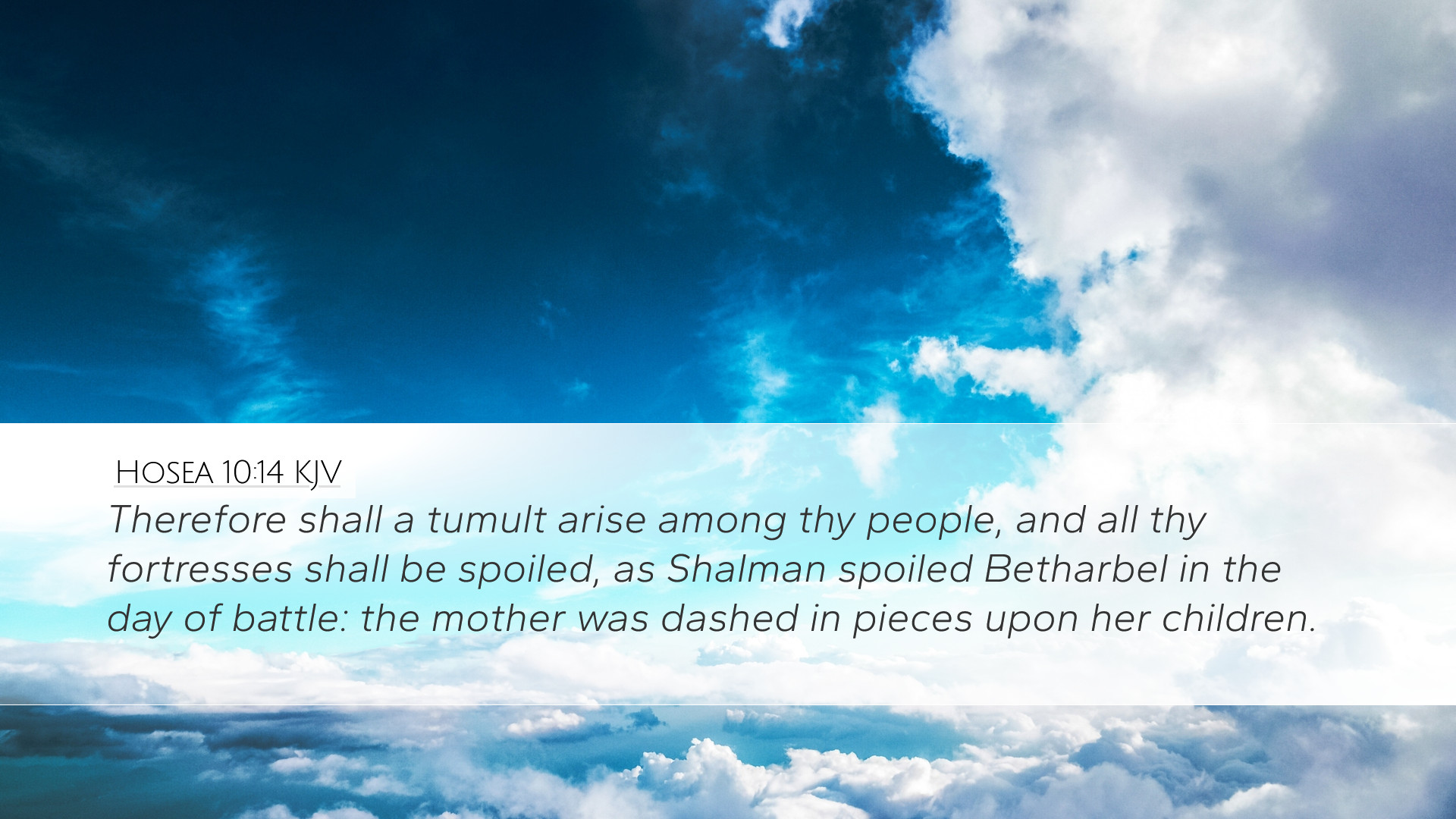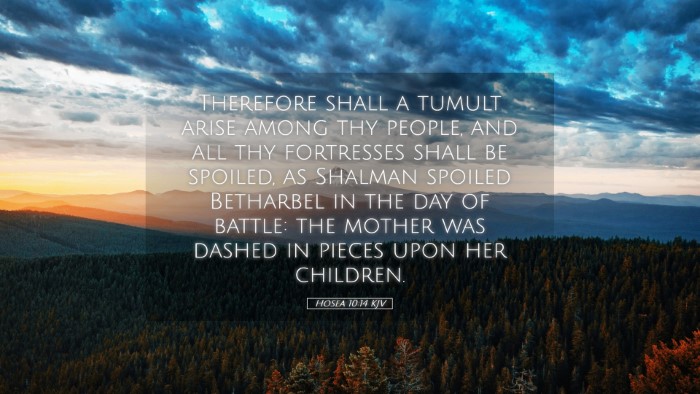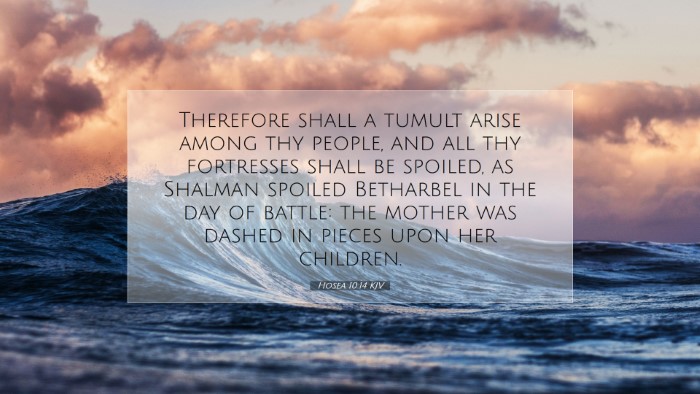Old Testament
Genesis Exodus Leviticus Numbers Deuteronomy Joshua Judges Ruth 1 Samuel 2 Samuel 1 Kings 2 Kings 1 Chronicles 2 Chronicles Ezra Nehemiah Esther Job Psalms Proverbs Ecclesiastes Song of Solomon Isaiah Jeremiah Lamentations Ezekiel Daniel Hosea Joel Amos Obadiah Jonah Micah Nahum Habakkuk Zephaniah Haggai Zechariah MalachiHosea 10:14
Hosea 10:14 KJV
Therefore shall a tumult arise among thy people, and all thy fortresses shall be spoiled, as Shalman spoiled Betharbel in the day of battle: the mother was dashed in pieces upon her children.
Hosea 10:14 Bible Commentary
Commentary on Hosea 10:14
Hosea 10:14 states: "Therefore shall a tumult arise among thy people, and all thy fortresses shall be spoiled, as Shalman spoiled Beth-arbel in the day of battle: the mother was dashed in pieces upon her children." This verse is a striking illustration of the impending judgment on Israel due to their unfaithfulness. Below, we explore insights derived from various public domain commentaries, highlighting the theological, historical, and moral implications contained within this verse.
Contextual Background
The Book of Hosea is a profound prophetic work that addresses the spiritual infidelity of Israel. These chapters represent a tumultuous era where Israel's sinfulness led them away from Jehovah, resulting in severe divine reprimand. Hosea uses vivid imagery to convey the gravity of their situation, and in 10:14, we observe a direct consequence of this rebellion against God.
Historical Context
Hosea prophesied during the final years of the Northern Kingdom of Israel, a time marked by political instability and moral decay. The reference to Shalman and the destruction of Beth-arbel portrays historical events that exemplify divine judgment. Commentaries emphasize that Shalman likely refers to one of the Assyrian kings known for his military conquests, foreshadowing the chaos to come for Israel.
Thematic Exploration
This verse brings forth several critical themes:
- Judgment: The tumult foretold is representative of God's judgment on Israel for their idolatry and infidelity.
- Destruction of Fortresses: The mention of fortresses symbolizes false security; despite their human efforts to protect themselves, they will be rendered useless before God's wrath.
- Family and Community Impact: The imagery of the mother dashed in pieces upon her children underscores the tragic consequences of sin that ripple through families and society.
Insights from Commentators
Matthew Henry
Matthew Henry provides a detailed exposition on Hosea 10:14, emphasizing the inevitability and fairness of divine judgment. He notes that the tumult is indicative of civil strife and invasion, not merely an act of divine retribution but a reflection of Israel's moral failures. Henry also mentions that God’s judgments often come through the very things that the people had placed their trust in, leading them to experience profound devastation.
Albert Barnes
Albert Barnes focuses on the metaphorical implications of the verse. He explains that the term “tumult” suggests not only external chaos but also inner turmoil among the people. Barnes elucidates that the historical reference to Shalman and Beth-arbel serves as a solemn warning to Israel, illustrating how swift and absolute their destruction will be if they continue in their rebellion against God. He highlights that the desolation will extend beyond mere physical destruction, affecting the community's very essence.
Adam Clarke
Adam Clarke's commentary highlights the emotional weight of the verse. He draws attention to the horrific image of a mother dashed in pieces upon her children, interpreting this as a forewarning about the complete annihilation that sin brings. Clarke also suggests that this highlights the destructiveness of sin within families and the divine justice system. He encourages believers to consider the weight of corporate accountability and how societal sin invites judgment upon families and nations.
Theological Implications
In Hosea 10:14, the theological implications are manifold:
- God’s Sovereignty: The verse reinforces the notion of God’s absolute sovereignty over nations and His authority to bring judgment.
- Consequences of Sin: It serves as a harsh reminder that unrepented sin leads to dire consequences, not only for the individual but for the collective community.
- Divine Justice: The destruction is a manifestation of God’s justice, ensuring that sin does not go unpunished, thus maintaining the moral order of creation.
Moral Lessons
For pastors, students, and theologians, Hosea 10:14 offers critical moral lessons:
- Warnings Against Idolatry: The passage serves as a poignant reminder that turning away from God invites grave consequences.
- The Importance of Repentance: It emphasizes that true repentance is necessary to avert divine judgment and restore one’s relationship with God.
- Reflecting on Community Responsibility: Believers are called to consider their impact on the broader community and the consequences of collective sin.
Application to Modern Context
The themes present in Hosea 10:14 resonate profoundly with contemporary issues. In today’s world, we witness the consequences of collective moral failures, where societies face turmoil due to various forms of idolatry, injustice, and immorality. The exhortation to heed the warnings of sin and to engage in earnest repentance is just as relevant now as it was in the time of Hosea.
Conclusion
Hosea 10:14 serves as both a warning and a call to reflect on the consequences of sin, the nature of divine judgment, and the importance of maintaining a faithful relationship with God. Through the insights gleaned from various commentators, it is clear that the text encourages a profound engagement with one's spiritual state, urging believers to seek genuine repentance and a return to God.


